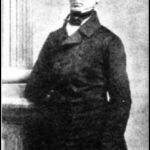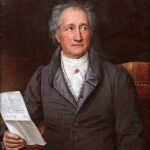Beethoven’s Unsterbliche Geliebte, or Immortal Beloved
‘My angel, my all, my own self’
Written at the age of 41, Beethoven’s famous love letter reads as a breathless expression of despair and hope, of love and devotion for an unnamed woman, his Immortal Beloved, whose identity has sparked two centuries of curiosity, research and debate. Here, we will take a look at the women who may have been the focus of his undying love.
Following Beethoven’s death, his secretary discovered the document among his belongings, tucked away between the portraits of women whom he had loved. It is not known whether the letter ever reached its intended destination and had been returned, or whether it had never been sent at all.
This pencil written document was analyzed and dated to 1812, written by the composer over two days in early July, in Teplitz, Bohemia (today, the Czech Republic). He had visited the resort to spend a number of weeks at the natural hot springs in an attempt to restore his health. It was also here that he met Johann Wolfgang von Goethe, spending a week together with the great poet, novelist, scientist and philosopher.
The letter indicates an ongoing romantic connection, both in person and in writing with the unidentified woman who had captured his heart and deepest affections. Beethoven refers to this woman as his Immortal Beloved in the ten page long passionate expression of his love and longing, revealing feelings of agonizing uncertainty, but also hope for a joined future.
‘While still in bed my thoughts rush toward you my
Immortal Beloved now and then happy, then again sad,
awaiting fate, if it will grant us a favorable hearing—I can
only live either wholly with you or not at all.’
Viewing Beethoven’s music within the context of the Romantic movement of the time, it can be argued that his artistry is characterized by the power of emotion, and introspection. We could even go so far as to say that in his personal life, in his lines to his Beloved, he echoes the spirit of Romanticism.
‘Oh God look upon beautiful nature and
calm your soul over what must be—love demands everything
and completely with good reason.’
We will look at the three most likely candidates of Beethoven’s affection according to Jan Swafford, from his 2014 biography of the composer. But first, a quick mention of the 1994 film – Immortal Beloved. The drama portrays Beethoven’s sister-in-law, Johanna van Beethoven as the recipient of this famous letter. Gary Oldman’s performance is passionate and moving, however, the romantic mystery comes to a conclusion that has been rejected by most musicologists.
The three candidates for Immortal Beloved of Beethoven
Beethoven had been in Prague before he journeyed on to Teplitz during the summer of 1812. It is here that he may have met his mysterious Beloved shortly before composing the letter. In the letter he talks of the need to come to a resolution of their situation. Scholars have conducted extensive research into the women who can be placed in the geographical area at that time, and who are known to have had romantic involvement with Beethoven.
Josephine von Brunsvik
The Hungarian countess, Josephine von Brunsvik was present in Beethoven’s life on and off over a number of years. She was his piano student. They were close friends, and correspondence (written in a similar style to this famed letter) tells us there was deep love and affection between them. The beautiful Josephine, however, went on to marry Count Joseph Deym, having four children together. In the years following Count Deym’s death in 1804, passionate letters and gifts of music evidence that Beethoven made his intentions clear to Josephine. Many scholars have come to the conclusion that she was Beethoven’s Beloved.
It is worth noting that the composer’s romantic associations were often with women of a social class above his own, causing its own set of inherent difficulties. Josephine remarried in 1810, to Christoph von Stackelberg with whom she spent two miserable years. Their relationship was finally over around the same time Beethoven wrote the letter to his Immortal Beloved. She also gave birth to baby Mynona (which spells anonym backwards) nine months later, who some suggest was Beethoven’s daughter.
|Related: A short biography: Josephine Brunsvik
Antonie Brentano
Austrian art collector and philanthropist, Antonie Brentano, was a trusted friend of Beethoven’s, in fact, he was close with all the family. The case is strong for Antonie because she was in Prague around the time the letter mentions the lovers last met, and she also gave birth eight months later to a baby Karl! However, Beethoven was a close friend of her husband, Franz Brentano too, who also served as his financial advisor. And many argue that it would have strongly gone against the composer’s morals to harm their family unit in this way. It is said, however, that Antonie was unhappy in her marriage. Beethoven dedicated various compositions to her, and also a hand-written score.
|Related: A short biography: Antonie Brentano
Bettina Brentano
German born Bettina Brentano was Franz’s half-sister. She was a multi-talented woman, a writer, a singer and a social activist, known for the relationships she built with artists and prominent figures such as Beethoven, Goethe, Franz Liszt, Karl Marx and Ralph Waldo Emerson, amongst others! Bettina was very bright, with a lively, vibrant personality. Beethoven was captivated by Bettina, and she clearly wanted to be his muse. In his biography, Jan Swafford says that she is the most likely candidate out of all three women. She married Achim von Arnim, the Romantic poet in 1811 and they had seven children together. Theirs was a long and loving marriage.
The mystery remains
Although this vast field of biographical research has not produced a definitive answer to the question of who Beethoven’s Immortal Beloved was, it is clear that her influence on his personal life and music was significant. She may have sparked the creative stream of composition that resulted in the Seventh and Eighth Symphonies! This was followed by a period of silence, however. Alas, their fate was decided, they were not to share a future together.
In the years to come, Beethoven’s loneliness and despair plumbed new depths, further compounding the miserable state of his health. He channeled this utter turmoil through his art, his calling remaining ever faithfully by his side.
The full letter to Beethoven’s eternal love, his Immortal Beloved
‘July 6
In the morning—
My angel, my all, my self.—only a few words today, in fact
with pencil (with yours)—only tomorrow is my lodging
positively fixed, what a worthless waste of time on such
things—why this deep grief, when necessity speaks—Can our
love exist but by sacrifices, by not demanding everything, can
you change it, that you not completely mine, I am not
completely yours—Oh God look upon beautiful nature and
calm your soul over what must be—love demands everything
and completely with good reason, so it is for me with you,
for you with me —only you forget so easily, that I must live
for myself and for you, were we wholly united, you would
feel this painfulness just as little as I do—
my trip was frightful, I arrived here only at 4 o’clock
yesterday morning, because they lacked horses . . . at the
next to the last station they warned me about traveling at
night, made me afraid of a forest, but this only provoked
me—but I was wrong, the coach had to break down on the
terrible route . . . still I had some pleasure again, as always
whenever I fortunately survive something—
now quickly to interior from exterior, we will probably see
each other soon, even today I cannot convey to you the
observations I made during these last few days about my
life—were our hearts always closely united, I would of course
not have to . . . my heart is full of much to tell
you—Oh—there are still moments when I find that speech is
nothing at all— cheer up—remain my faithful only treasure,
my all, as I for you the rest of the gods must send, what must
and should be for us—your faithful ludwig
Monday evening on July 6—
You are suffering you my dearest creature—just now I
notice that letters must be posted very early in the morning
Mondays—Thursdays—the only days on which mail goes from
here to K[arlsbad]—you are suffering—Oh, wherever I am,
you are with me, I talk to myself and to you—arrange that I
can live with you, what a life!!!! like this!!!! without
you—Persecuted by the kindness of people here and there,
which I think—I want to deserve just as little as I deserve
it—Homage of man to man—it pains me—
and when I regard myself in the framework of the
universe, what am I and what is he—whom one calls the
Greatest—and yet—herein is again the divine spark of man—I
weep when I think that you will probably not receive the
first news of me until Saturday—as much as you love me—I
love you even more deeply but—never hide yourself from
me— good night—since I am taking the baths I must go to
sleep—Oh god—so near! So far! Is not our love a true
heavenly edifice—but also firm, like the firmament—
good morning July 7
—while still in bed my thoughts rush toward you my
Immortal Beloved now and then happy, then again sad,
awaiting fate, if it will grant us a favorable hearing—I can
only live either wholly with you or not at all
yes I have resolved to wander about in the distance, until I
can fly into your arms, and can call myself entirely at home
with you, can send my soul embraced by you into the realm
of spirits—yes unfortunately it must be—you will compose
yourself all the more, since you know my faithfulness to you,
never can another own my heart, never—never—O God why
have to separate oneself, what one loves so and yet my life
in V[ienna] as it is now is a miserable life—
at my age now I need some uniformity and consistency of
life—can this exist in our relationship?—Angel, right now I
hear that the mail goes every day—and I must therefore
close, so that you will receive the L[etter] immediately—be
calm, only through quiet contemplation of our existence can
we reach our goal to live together—be patient—love
me—today—yesterday—What longing with tears for
you—you—you—my love—my all—farewell—o continue to love
me—never misjudge the most faithful heart of your beloved
L.
forever yours
forever mine
forever us’
A.K.










